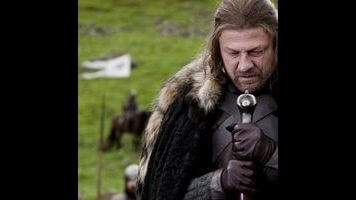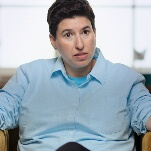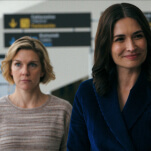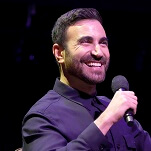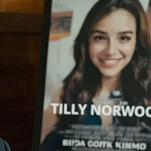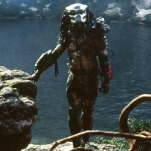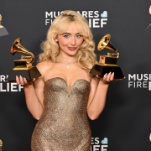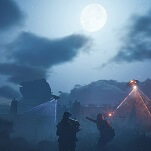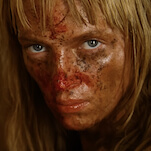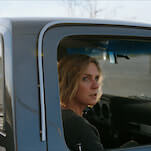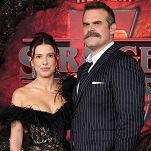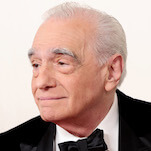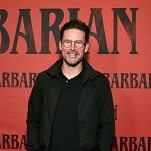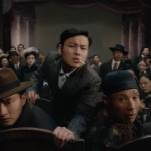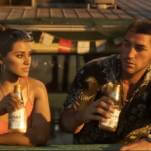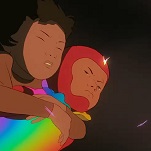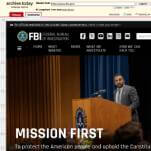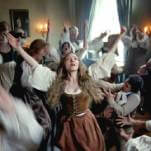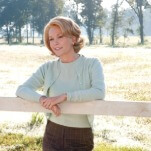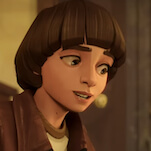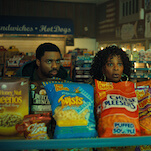(This Game Of Thrones post is for people who have read at least the first two books in the book series. It is written from the point-of-view of someone who has read those books and for the benefit of fans of the books. All discussion points are valid, up to and including the events of the fifth book. However, we would ask that you clearly mark spoilers from the third, fourth, and fifth books. The review itself will be non-spoilery, and talk of how events here portend future events will be clearly marked with a spoiler warning in the section following Stray Observations. If you would still like to read the review but haven’t read the book, thus, you can, but you should proceed with caution after the spoiler warning and in comments. Those of you who haven’t read the books can also check out our reviews for newbies.)
“Valar Morghulis” is an often fascinating, sometimes frustrating, occasionally moving episode of television. It bites off more than it can chew in many ways, as it attempts to bring seemingly every plotline for the season to the place it needs to be for season three to begin. It deviates from the source material in several significant ways, not the least of which is taking one of the book’s most famous sequences and doing something largely different with it. It sprawls all over the place and cuts between so many characters that the overall effect can be exhausting. There is a point around the middle of the episode where things abruptly cut to Arya and her companions picking their way through the wilderness, and I realized that I hadn’t really missed her—despite my generally pro-Arya stance—simply because the hour felt over-stuffed enough as it was. A Clash Of Kings ends with a cascading series of cliffhangers that unspool over 100 pages or so (with the Battle of Blackwater inserted right in the middle), and this was the TV equivalent of that—a little rushed, occasionally unsatisfying, but good at making it count when it had to.
Of all of the episodes this season, this is the one I’m most interested to read the newbie reaction to. There are a number of things in this episode that either don’t track with what happened in the books or seem to abandon character motivation entirely. Take, for instance, the burning of Winterfell. In the books, the culprits who burn down the place (whose identities I will leave secret for those wishing to remain spoiler-free) are not only identified but turned into significant new villainous figures for the series to follow going forward. Here, it’s strongly implied that Theon’s men burned the place down on the way out, but nobody ever says this. I wouldn’t be surprised if some newbies latch onto this as a mystery to be solved in future seasons, nor would I be surprised if the producers try to make it one. (Also falling into this line of “Who’s doing what for what reason?” is Jon’s killing of Halfhand, though that one at least gets some attempt at a character through line.)
That said, my larger point (and one of the points I got into in my essay about why the show’s second season has improved on the first) remains: The series has left the books behind in such a way that it’s much easier to accept it as a separate piece of entertainment from those that inspired them. We who’ve read the books will always have a sneaking suspicion what’s coming—the writers would never leave out certain character moments or big sequences—but the show has found ways to surprise us, and has taken some characters and tweaked them in interesting ways. These changes may not always work for all of us—I’m still not sure what the hell is going on with Arya, though the finale went a long way toward returning Dany to my affections—but the fact remains that the show has built distance between itself and the books, making it much easier to judge as a piece of television and not as a “book on film” adaptation. That’s both exciting and enervating.
The big changes tonight come from the Dany storyline, as they so often have this season. We’ve finally gotten to the House of the Undying. I long suspected the show wouldn’t even attempt to dramatize this section, since what’s there on the page is so hallucinatory and weird that it would be hard for even David Lynch to make it what it needed to be. (There’s also the possibility that the flash of images Dany sees in the book would have utterly spoiled the rest of the series. They can be obscured on the page, but a camera has a way of literalizing things.) If the show had just punted this whole sequence and returned Dany’s dragons to her with a minimum of fuss, I would have been disappointed, but I would have understood. This season’s Dany storyline has been largely about her being tempted by the pleasures she cannot have, now that she is on her relentless march for the Iron Throne, and though the “my dragons!” section of this storyline was trying, it was easy, at least, to see what all involved were trying to do with it.
The House of the Undying segment of the show isn’t as wild and weird as it is in the book, but as with the Battle of Blackwater, I think the series found a way to suggest much of what the book says happens without actually showing it. The scene where Dany steps out of one room in the building and ends up in what appears to be a gutted throneroom in the Red Keep (that was the Iron Throne, right?) was strange and haunting, and the moment when she steps out beyond the Wall both mentally prepared us for Sam facing down the ice zombies we haven’t spent much time with since this series began and gave us the surprisingly heartbreaking moment of her having to leave Khal Drogo behind all over again. If there was a theme to tonight’s episode—and I’m not sure there was, given how quickly it tried to get everything ready for next season—it was the question of what you give up for power. Dany never had the choice of giving up Drogo before, yet now she does. Her choice to leave him (and their suitably adorable baby) to find her dragons is heart-rending, even as you know it’s all an illusion (granted, an illusion designed to keep Dany comfortable, so the dragons can keep pumping out the magic juice). The book version of this section was a string of strange images that stick in the mind; the TV version cuts to the emotional quick. I think that comparison nicely outlines the respective versions’ individual strengths.
Indeed, “Valar Morghulis” chooses at every turn to toss in emotional climaxes where perhaps they don’t strictly belong. After “Blackwater,” it feels a bit odd to be returning to all of the far-flung characters on their many adventures, but the show does a solid job of reorienting us in the entirety of this world. We spend time at King’s Landing first, then start jetting further and further from that central point, until we’re ending on Jon going down to meet Mance Rayder, Dany locking Xaro in his massive (empty) vault, and Sam confronting that lumbering army of wights. (You’ll notice that all of these stories have the least to do with the courtly intrigue at King’s Landing and are also the farthest from it geographically.) We learn the fate of one character whose life was hanging in the balance last week—Tyrion—yet a few others are left to dangle from the cliff until next season. Right when we’re thinking of someone—Stannis—the episode inevitably cuts to him, to let us know what’s up and where that character will be going next year.
It’s a tricky balancing act, and it can’t help but feel unsatisfying in places. The whole season was building to last week’s battle, which means that this week’s episode has to be filled with a lot of throat-clearing and preparation for whatever it is to come next year. (This one probably won’t be at the very top of the series’ Emmy tapes.) Since there’s so little actual plot and since what plot there is relies so heavily on cliffhangers, the choice to always make the play for the emotional gut punch ends up being a smart one. I pontificated a couple of weeks ago about how little I cared about the relationship between Robb and Talisa, yet I found myself moved by his headstrong decision to marry her all the same. The wanderings of Brienne and Jaime haven’t felt especially motivated in the last few episodes, but the bit where she protects him from the Stark men, then avenges the deaths of the girls strung up from the tree has a kind of brutal satisfaction to it all the same. The relationship between Arya and Jaqen has been great fun, so the show gives us one last moment between them—and kicks off Arya’s motivation for the next season and beyond. Luwin dies, and it’s incredibly moving, as is the sight of Winterfell burning in the background, even as the question of just how it happened hangs over everything that follows.
The best episodes this season have united these storylines behind singular themes or discussions of topics important within the show’s universe. “Valar Morghulis” takes a stab at this from time to time, but it can never pause long enough to get the stronger thematic motors running. There’s a moment when Shae offers to Tyrion to take him away to Pentos, and Tyrion’s realization that he loves outsmarting bad people too much to ever leave is masterfully played by Peter Dinklage. It’s also clearly meant to let us ponder just what all of these people are willing to give up (or not give up) in the pursuit of what they want, be it Robb marrying the girl who could destroy a key alliance or Theon being ready to lose his life in pursuit of a half-baked dream or Dany giving up a life of perfect happiness for whatever comes next. These ideas are there—as are ideas about the ways that women don’t have a place of power in this society or about how the future remains unknown to even the best of us—but the episode, even at 70 minutes, just didn’t have room to breathe. It felt, for all the world, like an episode where the writers moved pieces around on the game board, and while that’s necessary in a serialized drama, it’s weird to make that kind of episode the finale.
This will hopefully all change next year. I’m on record as preferring this season to the first, and while I’ve loved it for the most part, even I will admit that the back half of the season was often rushed, trying to get first to the big battle, then to wrap everything up in an hour-plus-change. It may just be that fitting all of the events of Clash Of Kings—as well as servicing popular characters from the show who didn’t have storylines in the book, like Robb and Jaime—into one season was the sort of thing that would have always been impossible. Reportedly, season three will only adapt approximately half of A Storm Of Swords, and while that book is meaty and action-packed enough to provide plenty of big plot moments, it will hopefully also restore some of the quieter, character-based moments that season one and the first half of this season excelled at. This was a great, consistent season of television (probably my third-favorite drama of the TV season, behind only Mad Men and Homeland and just ahead of Breaking Bad, in case you need something to argue about), but it too rarely reached for anything transcendent, and that’s the mark of an all-time great TV series.
Yet I’m not sure that matters, in the long run. When this series is on, it’s like nothing else on TV at providing a rich, textured world to get lost in. There were moments in tonight’s episode—be they Jon and Ygritte overlooking that giant camp or the tears in Michelle Fairley’s eyes when Robb told his mother just why he didn’t care about betraying walder Frey—where it felt as if I could leave my house, take a couple of right turns, and end up in Westeros. The series didn’t always achieve that palpable feeling in its earliest days, but it had it in spades this season. This was a rich, full-bodied season of television that moved with confidence and purpose, even when I didn’t quite know what it was doing (and even when I got too hung up on how the books had done the same things). It was filled with themes worth discussing and characters worth getting invested in, and it made the big moments count when it had to.
Sometimes, watching this series is a little like Stannis Baratheon staring into that flame, Melisandre at his side, beckoning him to see what’s coming. Those of us who’ve read these books know what’s coming, to a degree, even as we don’t have Melisandre’s confidence about how it will all end. The moment when Stannis stares into the flame and begins to see what she says he will just might be my favorite of the episode, simply because all of us are standing there with him, suddenly realizing where all of this is heading, sucking in our collective breath, and getting ready for the plunge to come. This has all been great fun, but, like Stannis, I can’t wait for whatever’s next.
Stray observations:
- I’m sort of surprised the show dropped the “Stannis is alive” information this soon, though I guess it also dropped the “Bran and Rickon are alive” information in somewhat clumsy fashion, much sooner than I thought it would. On the other hand, join me in the spoiler section for one prediction I made that did come true.
- Sophie Turner acquits herself well in the moment where she’s finally alone and can let out her sheer glee at no longer being betrothed to Joffrey. That whole scene had a bit too much of a Masterpiece Theater feel to it, with the characters standing and solemnly declaiming about what had happened and what they wanted, but it was almost worth it for Sansa’s smile. (This also presupposes that Masterpiece Theater has lots of scenes where horses take dumps in throne rooms.)
- I really did think the show wouldn’t have Jaqen change his face, given how great the actor that plays him has been, but it followed through with that moment, though the effects budget was apparently gone, given the lack of morph.
- I’m always impressed with just how much this series trusts the audience to keep straight. Yes, that’s a hallmark of HBO shows, but I’m still always pleased when, say, Melisandre and Margaery drop out for several episodes, then come back with very little reminder of who they are or what their importance has been.
- I will say this: I found Jon’s turning a bit of an improvement over the book (for reasons I’ll outline in the spoiler section), and I finally started to get invested in the television version of him in that moment as well.
- I wasn’t looking forward to Maester Luwin’s death, as he’s one of my favorite ancillary characters on both page and screen, and the moment did not disappoint in terms of sadness.
- Super-creepy: Littlefinger comparing Sansa to her mother. The guy’s a real winner, no?
- One invented scene I really liked was Varys going to talk to Ros. I know some fans aren’t terribly fond of the character of Ros, but I have come to like her in spite of myself. I also think the show needs to give Varys more to do, and I liked him referring to Littlefinger seeing her as “a collection of profitable holes.”
- This episode was beautifully directed by Alan Taylor, particularly in the use of an approximation of candlelight to light such scenes as Luwin giving Theon his council to run and take the black.
- Back-story corner: This isn’t back-story so much as one of those book things that the show hasn’t done as great a job of. One of Sam’s companions is Dolorous Edd, and for my money, the series hasn’t done nearly as good a job of making him a teller of mordant jokes as the books have.
- Before I get to an extra-long spoiler section, a few words. As always, it’s been great doing these reviews for you guys. You’ve kept me honest and on-task, and you’ve always been able to remind me of stuff from the books that’s either slipped my mind or that didn’t occur to me. David and I have both had great fun writing these pieces and talking about this show, and I can’t wait for season three to begin. Just 10 more months!
Here be spoilers!:
- A very light one, to scare away all the people who might still be reading: I was glad to see that wheelbarrow as the Stark sons and entourage escaped Winterfell, because I became seized suddenly with the thought of how strange it might seem to see Hodor toting around Isaac Hempstead-Wright when he’s a teenager.
- Okay, I don’t understand the choice to not split up Rickon and Bran at all. In the back of my head, I was playing around with the idea that to keep Osha on the show, the writers might let Luwin live and send Rickon off with him, but, no. Everybody’s going to be sticking together. (I mean, I’m glad for more Osha, but just strategically, keeping Rickon and Bran separate makes more sense.)
- I do, however, like the inscrutability of Jon killing the Halfhand. In the book, it’s very clear just why everything happens, but here, there’s a nice sense that it could be Jon’s temper or it could be Qhorin baiting him or it could be Jon suddenly realizing what that stray mention to him from the Halfhand was two weeks ago. I like any time motivation is muddied a bit, and this was no exception.
- We didn’t have Roose Bolton around to leer at Robb as he was hanging out with Talisa (who is now obviously not Jeyne, another strange choice), but we still got the gist of it from Catelyn telling him, “Bad things will happen if you do this!” Gee, y’think? (Also, is there any way next season doesn’t end with the Red Wedding?)
- I’m also a bit baffled as to how the writers plan on getting Sam out of his particular scrape, though it made for a cool image, so I’ll allow it. It did finally open up the fact that the world beyond the Wall is filled with strange terrors and magical beasts, which the season has been lacking just a bit. (Where are my mammoths?!) Also: Was that dude on the horse meant to be Coldhands?
- I was pleased to see that my prediction of Ramsay Bolton not appearing this season turned out to be true. I assume he will turn up next year, since we’re not going to lose Theon as a character for several seasons, but I didn’t see an organic way to get him into this season’s storylines, and it seems the writers didn’t as well.
- The show already playing up the creepy (and one-sided, I hope) sexual tension between Littlefinger and Sansa is a good (if, again, creepy) choice, I think, given what’s coming for the two characters in the seasons to come.
- The series’ choice to really play up the love between Tyrion and Shae is just going to make the moment when he kills her all the more heart-rending, I think.
- Do we assume Dany still books passage with Barristan Selmy? Do we assume any newbies will recognize who he is at that point?
- Finally: Dream-cast and dream-plot your season three. I’d make episode nine the Red Wedding, then contort things to end episode 10 with Cat’s resurrection. Go.
